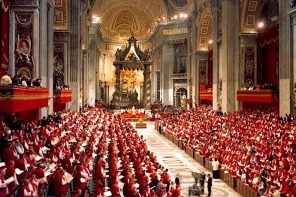Too little, too late.
That seems to be the mainstream take on yesterday’s apparent Vatican backtrack, ordering Bishop Richard Williamson to recant his previous positions of apparent Holocaust denial. This criticism may miss the larger point. For the rescinding of excommunication was never about the Holocaust nor about Holocaust denial; it was about modernism and the rolling back of Vatican II.
When the rescinding of the excommunication of four Lefebvrite bishops was announced, it was only the first step in their re-entry into communion with the Catholic church. The four bishop are essentially non-personae until such time as they are assigned new duties, allowing them to preside over the sacraments, ordain new priests, etcetera. Now we know that Bishop Williamson will not be so assigned until he recants his views about the existence of Nazi gas chambers in some suitably public way—a way at least as public as his recent interview on Swiss television.
The reason this Pope has troubled to say this publicly is that he wants the good services of Bishop Williamson. Not because he is secretly anti-Semitic, but because he is not-so-secretly anti-Modern. Apologizing for the Church’s previous role in anti-Semitic attitudes worldwide is one of the few gestures from the Second Vatican Council with which John Paul II and Benedict XVI seemingly agreed. They are not so well disposed to the larger idea of “a new openness to the modern world” announced at that Council. They remain hostile to, or at best ambivalent about, all of modernism’s assumptions—feminist, secular, and more.
These four bishops were consecrated by Bishop LeFebvre, one of the leading voices of opposition at that Council in the mid-1960s. The Vatican has, since 1979 and the untimely death of Pope John Paul I, been committed to rolling back most of the liberal reforms of that Council. Cardinal Ratzinger worked tirelessly to this end for John Paul II; he now continues to do in his own name, as Benedict XVI.
Again, the Pope’s interest in this case is not now and never was anti-Semitism. It is anti-modernism. And to that end, he has demonstrated a surprising willingness repeatedly to shock and antagonize in the name of articulating that position as clearly as he can.




